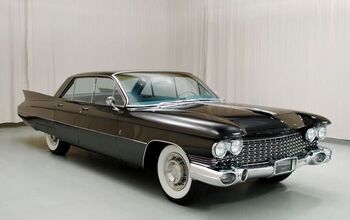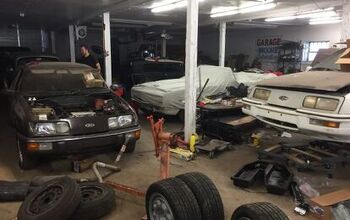Piston Slap: A Tale of Collector Car Insurance

James writes:
Are there any good insurance options for old, low-value non-collector cars? I’m going to have a pretty good handful of antique-plated vehicles in the next few years, and it seems silly to have regular insurance for stuff that might get driven once or twice a month, but “collector” car insurance is geared towards show-winner ’65 Mustangs and such.
Sajeev answers:
As much as I hate that picture and the publicity stunt behind it, the point is proven: nobody treats an antique like a late-model machine. Long story short, not all insurance plans are only for guys with ’69 Camaros, ’65 Mustangs or even more valuable antique machinery. But you gotta do your homework.
I’ve discussed this before, and in the interest of not being a complete shill (again), I will just say that I left the big insurance company for that other group mentioned in the hyperlink.
The big insurance company did cover my under-appreciated 1988 Mercury Cougar XR-7, but I had to fight for it. Somehow the conversation went to a 1988 Mustang GT, which did apply. And that offended me more than I’d like to admit. It is truly amazing how wrapped up us classic car guys get in our stupid machines, but I digress…
My non Fox Mustang was deemed worthy after multiple head-butts with their underwriting department: pulling production numbers (far rarer than a ‘stang, especially the XR-7), photos, receipts (showing resto-modification) to show how they can indeed prove this is a bona-fide classic car. And they capitulated.
When it was time to insure TTAC’s Ford Sierra, I called the same big company and they were miffed. Supposedly the Sierra couldn’t even be imported to America, much less insured! After I told them how to do their job (i.e. Google), I found a specialty shop.
So I got an estimate from that classic car specific company (first hyperlink) on the Cougar and the Sierra. I found the process easier and a bit cheaper. All they wanted were photos, explanation of the car’s modifications/value/usage and never mentioned how it isn’t a Fox Body Mustang. The lady on the phone also complimented me on both cars, especially the brown Sierra she’d never seen before. Which was the complete opposite of the “If This Was a Mustang, Sir!” insult I felt from the other place.
The only problem: I have yet to need the insurance policy. That’s when you actually know when you got good insurance.
So for you, dear reader, I suggest you look at all classic car insurers around, ask your friends in this hobby, and get a quote from ’em all. Maybe one price is right, maybe one agent hits all the right buttons, but in the end, it will be worth it.
[Image: Shutterstock user Mike Flippo]
Send your queries to sajeev@thetruthaboutcars.com. Spare no details and ask for a speedy resolution if you’re in a hurry…but be realistic, and use your make/model specific forums instead of TTAC for more timely advice.

More by Sajeev Mehta
Latest Car Reviews
Read moreLatest Product Reviews
Read moreRecent Comments
- Jalop1991 In a manner similar to PHEV being the correct answer, I declare RPVs to be the correct answer here.We're doing it with certain aircraft; why not with cars on the ground, using hardware and tools like Telsa's "FSD" or GM's "SuperCruise" as the base?Take the local Uber driver out of the car, and put him in a professional centralized environment from where he drives me around. The system and the individual car can have awareness as well as gates, but he's responsible for the driving.Put the tech into my car, and let me buy it as needed. I need someone else to drive me home; hit the button and voila, I've hired a driver for the moment. I don't want to drive 11 hours to my vacation spot; hire the remote pilot for that. When I get there, I have my car and he's still at his normal location, piloting cars for other people.The system would allow for driver rest period, like what's required for truckers, so I might end up with multiple people driving me to the coast. I don't care. And they don't have to be physically with me, therefore they can be way cheaper.Charge taxi-type per-mile rates. For long drives, offer per-trip rates. Offer subscriptions, including miles/hours. Whatever.(And for grins, dress the remote pilots all as Johnnie.)Start this out with big rigs. Take the trucker away from the long haul driving, and let him be there for emergencies and the short haul parts of the trip.And in a manner similar to PHEVs being discredited, I fully expect to be razzed for this brilliant idea (not unlike how Alan Kay wasn't recognized until many many years later for his Dynabook vision).
- B-BodyBuick84 Not afraid of AV's as I highly doubt they will ever be %100 viable for our roads. Stop-and-go downtown city or rush hour highway traffic? I can see that, but otherwise there's simply too many variables. Bad weather conditions, faded road lines or markings, reflective surfaces with glare, etc. There's also the issue of cultural norms. About a decade ago there was actually an online test called 'The Morality Machine' one could do online where you were in control of an AV and choose what action to take when a crash was inevitable. I think something like 2.5 million people across the world participated? For example, do you hit and most likely kill the elderly couple strolling across the crosswalk or crash the vehicle into a cement barrier and almost certainly cause the death of the vehicle occupants? What if it's a parent and child? In N. America 98% of people choose to hit the elderly couple and save themselves while in Asia, the exact opposite happened where 98% choose to hit the parent and child. Why? Cultural differences. Asia puts a lot of emphasis on respecting their elderly while N. America has a culture of 'save/ protect the children'. Are these AV's going to respect that culture? Is a VW Jetta or Buick Envision AV going to have different programming depending on whether it's sold in Canada or Taiwan? how's that going to effect legislation and legal battles when a crash inevitibly does happen? These are the true barriers to mass AV adoption, and in the 10 years since that test came out, there has been zero answers or progress on this matter. So no, I'm not afraid of AV's simply because with the exception of a few specific situations, most avenues are going to prove to be a dead-end for automakers.
- Mike Bradley Autonomous cars were developed in Silicon Valley. For new products there, the standard business plan is to put a barely-functioning product on the market right away and wait for the early-adopter customers to find the flaws. That's exactly what's happened. Detroit's plan is pretty much the opposite, but Detroit isn't developing this product. That's why dealers, for instance, haven't been trained in the cars.
- Dartman https://apnews.com/article/artificial-intelligence-fighter-jets-air-force-6a1100c96a73ca9b7f41cbd6a2753fdaAutonomous/Ai is here now. The question is implementation and acceptance.
- FreedMike If Dodge were smart - and I don't think they are - they'd spend their money refreshing and reworking the Durango (which I think is entering model year 3,221), versus going down the same "stuff 'em full of motor and give 'em cool new paint options" path. That's the approach they used with the Charger and Challenger, and both those models are dead. The Durango is still a strong product in a strong market; why not keep it fresher?


































Comments
Join the conversation
That 59 Chevy is a rustbucket, there is a giant cloud of rust erupting from it. It probably had just enough bodywork done to it to make it presentable, then its crunchy time. Just like the Fast and Furious movies.
My uncle insures the bulk of his fleet ('56 and '57 Thunderbirds, '57 Ranchero, '59 unrestored original Skyliner, '56 Continental Mark II) with JC Taylor and has been very happy with them for decades. The only one not with Taylor is the resto-in-progress '57 'Bird, which is on a Hagerty policy as they're the only ones we are aware of in the classic car insurance business who will write a comprehensive-only policy for a car in long-term storage or undergoing restoration. When I lived in MI, my regular AAA Michigan policy let me cover my in-long-term-storage '65 Mustang with a comp-only policy, but when I moved to Texas, AAA Texas won't do that - have to have at least property damage & medical liability as well (I thought it might be a Texas law thing, but it's not). Since the car is immobile, I thought that silly (getting them to do a comp & collision on my car trailer was a pain in the ass, too, another thing AAA Michigan had no problem with). I've gone with Hagerty for the '65.